Coronavirus Higher Education Industry Briefing: April 28
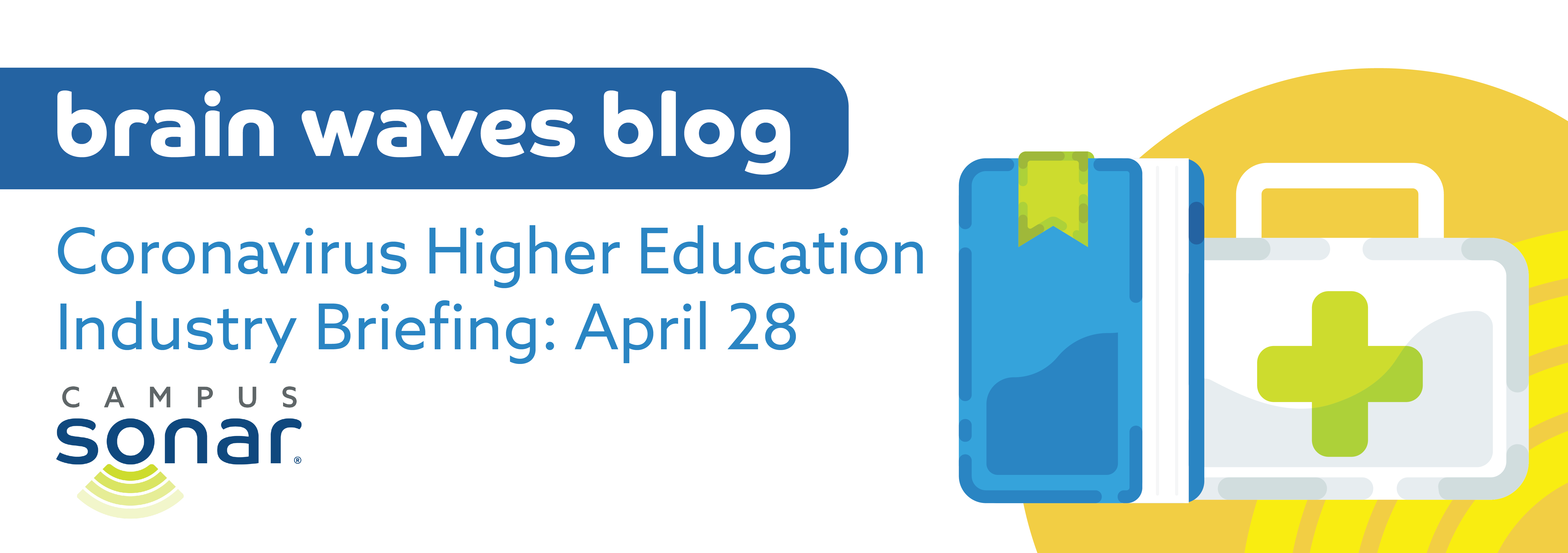
Influencers Start Spreading the News
Today’s Briefing analyzes publicly available online conversation in the U.S. and on Reddit and YouTube (which span beyond the U.S.) about the coronavirus and higher education from April 20–26. In this analysis of volume, topics, sentiment, and key audiences, we highlight how university research news spreads via online influencers, student athletes seeking new teams, and students continuing to speculate about the fall semester on Reddit.
Because of the changing nature of social media data and our understanding of the conversation, each Briefing covers a distinct point in time. Comparisons from Briefing to Briefing may be helpful, but we can’t draw correlations like we could if we were using other datasets such as surveys or historical social media data.
Slightly Less Conversation, but a Larger Percentage about Fall Semester or Beyond
We identified about 442,000 mentions of the coronavirus and higher education April 20–26, ranging from 36,000–79,000 mentions per day. This is about seven percent fewer mentions than the week earlier. Eight percent of all mentions related to the fall semester or beyond (three percentage points higher than last week).
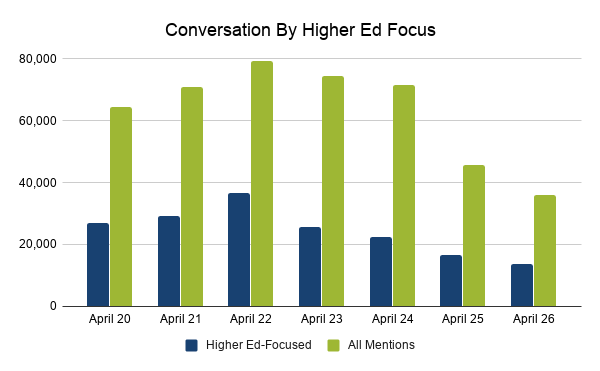 39 percent of all mentions were higher ed-focused. Remember, our industry-level analysis only captures general higher education mentions. If someone mentions the name or acronym of an institution without using a higher ed term (e.g., campus, university, college, classes, etc.), it’s not included in this analysis. Actual volume of conversation across the industry is likely much higher.
39 percent of all mentions were higher ed-focused. Remember, our industry-level analysis only captures general higher education mentions. If someone mentions the name or acronym of an institution without using a higher ed term (e.g., campus, university, college, classes, etc.), it’s not included in this analysis. Actual volume of conversation across the industry is likely much higher.
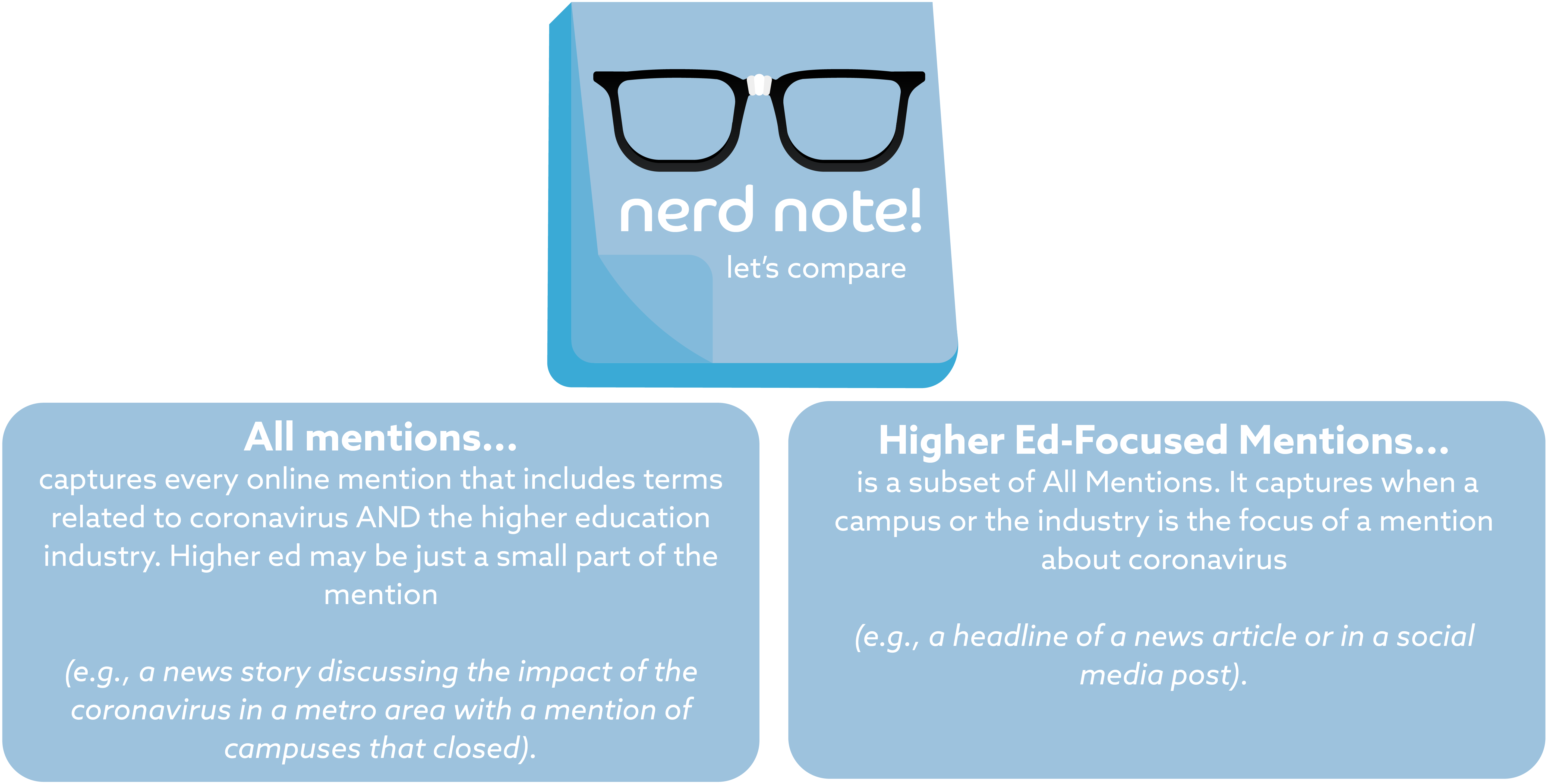
Increased Concentration of Fall Semester Conversation on News Sites
Social media was the largest source for all mentions, higher ed-focused mentions, and student mentions. The most common source for mentions of the fall semester and beyond was news sites; 50 percent of mentions referencing the fall were in the news, compared to 27 percent last week. The percentage of student conversation on social media (59 percent) was higher than previous Briefings, largely because of a student-driven word-of-mouth Twitter campaign from a specific institution, detailed in the Audience Insights section.
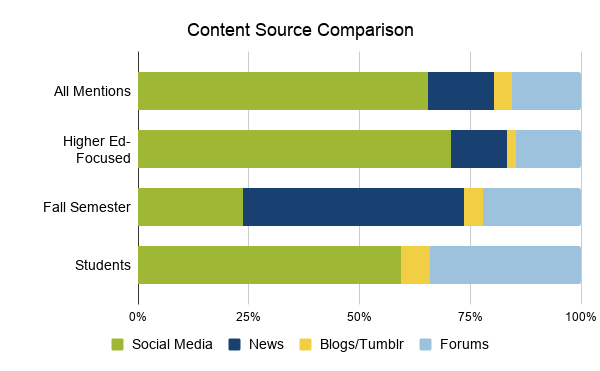 Remember that due to data access restrictions, we aren’t including Facebook, Instagram, Snapchat, TikTok, or LinkedIn in our analysis. Your campus social media manager is the best source of information regarding conversation on those networks. Depending on the software used, social listening for a specific campus can include Facebook and Instagram mentions once account managers verify admin access.
Remember that due to data access restrictions, we aren’t including Facebook, Instagram, Snapchat, TikTok, or LinkedIn in our analysis. Your campus social media manager is the best source of information regarding conversation on those networks. Depending on the software used, social listening for a specific campus can include Facebook and Instagram mentions once account managers verify admin access.
Topic Trends Include Social Campaign and Three Specific Campuses
The following word cloud includes the top 100 people, phrases, and emojis in higher ed-focused conversation April 20–26. Today’s Briefing reviews the top 10 topics and highlights the institutions within the top 20 topics. Personally, I was surprised that neither Purdue nor its president Mitch Daniels were mentioned in top topics, but that could be because the mentions of their announcement regarding fall and related discussion referred simply to “Purdue” without other higher education terms (mentions like that would not be captured in our industry dataset).
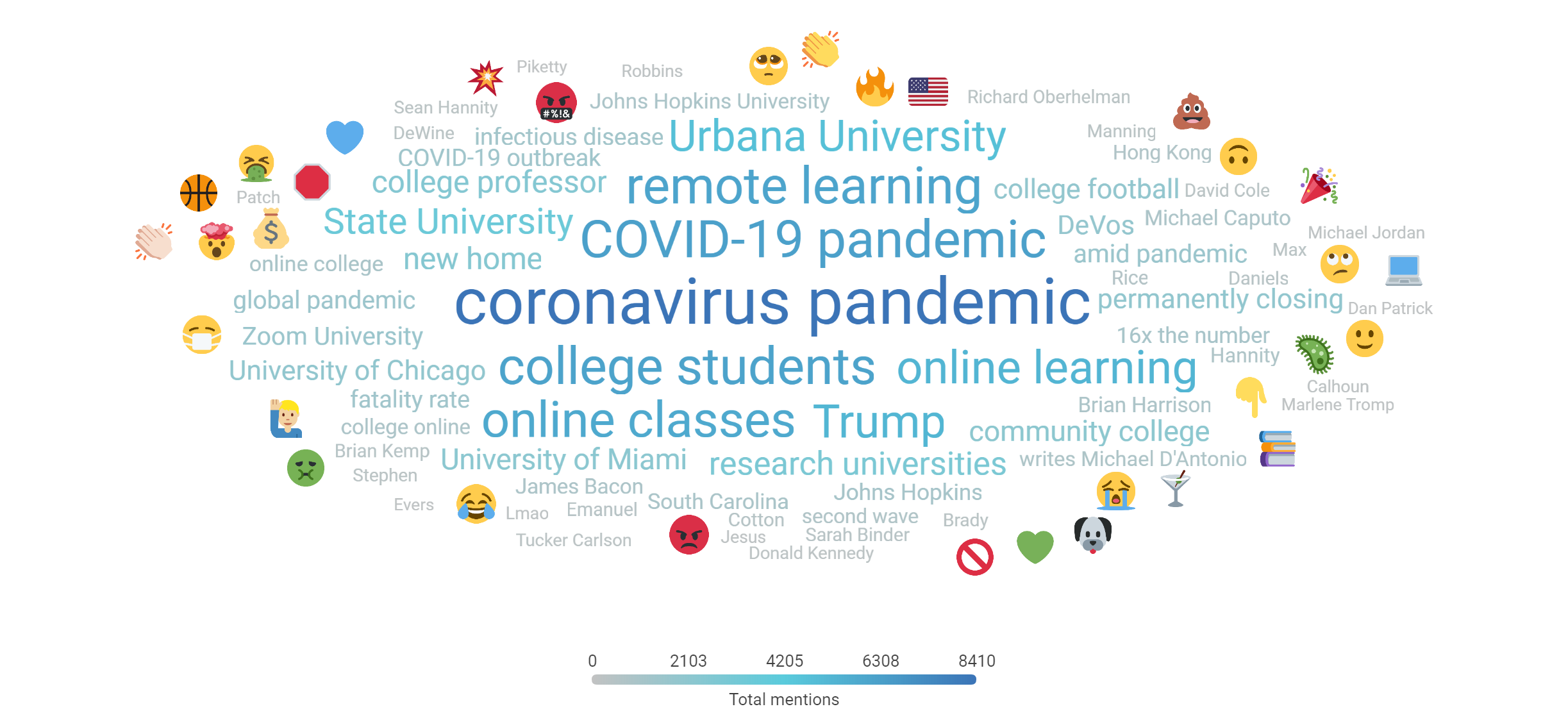
The general topics of coronavirus, COVID-19, college students, and remote/online learning and online classes continue to be our most common topics. Next is “Trump,” which is used in a variety of contexts. Urbana University announced on April 21 that it would discontinue physical operations at the end of the 2020 spring semester. Discussion of the closing made it number 8 on our top topics list, and half of the approximately 4,750 mentions were from affected students and others amplifying their message. We’ll dig deeper into that in the later Audience Insights section. “State University” and “research universities” were right behind Urbana University as top topics 9 and 10; those around 6,000 mentions referred to many public, state institutions and members of the Association of American Universities (AAU).
#ProudToBeOnTheirTeam is a social media campaign from the AAU and their member institutions’ athletics representatives, proclaiming they stand with their colleagues and “America’s leading research universities as they take the fight to COVID-19 in our labs and hospitals.” The AAU shared a Twitter moment highlighting contributions from coaches and players. This was the third most popular hashtag in our higher ed-focused dataset, with 2,550 mentions and an estimated 38.7 million impressions.
Two other institutions were named in our top 20 topics: University of Chicago and University of Miami. The University of Chicago was mentioned in a variety of contexts, including popular media coverage of a working paper released by the Becker Friedman Institute for Economics at UChicago titled Misinformation During a Pandemic. Almost all of the University of Miami mentions are related to a single research study. These situations are an interesting case study in the role online influencers play in public perception of university research.
Tracing the Spread of University Research News on Social Media
On Friday, April 24, the Miami Herald reported on a University of Miami project that tested about 1,400 people in Miami-Dade county for COVID-19 antibodies over a period of two weeks. University researchers estimate that the true amount of infection lies between 4.4–7.9 percent of the population, with 6 percent being the best estimate. While the university was mentioned as the news spread, various implications of the findings were emphasized depending on the source when it was shared on social media. Examining the spread of this news in the 2.5 days following the press conference offers an interesting case study in the role of social media influence during breaking news.
The first mention in our dataset was a tweet from a reporter at the South Florida Business Journal. It stuck to the facts, but only received four retweets and likes despite his over 9,000 followers. The Miami Herald’s tweet a few hours earlier received less than 100 retweets and likes from its over 460,000 followers. The thousands of shares of this study from Friday through the weekend that launched it into our top 20 higher ed-focused topics can be attributed largely to four individuals with online influence.
- An April 26 tweet from John Solomon, founder of Just the News, an independent journalism website that launched in February 2020. Solomon, formerly of The Hill, The Washington Times, and The Associated Press, shared an article written by Daniel Payne, assistant editor at The College Fix with his over 500,000 Twitter followers. Just the News relies on distribution through YouTube, podcasts, ebooks, and social media. Solomon’s tweet highlighted that infections “could be 20x higher than official stats,” and the results were a “further sign that the death rate is likely way lower and many cases are mild or asymptomatic.” His tweet received over 7,000 retweets and likes.
- An April 24 tweet from Ellen Carmichael, president of The Lafayette Company, a political communications firm. She shared the Miami Herald article with her over 20,000 Twitter followers, mentioning that “this puts the fatality rate at ~0.14% there.” In subsequent replies to her own tweet, she shared quotes from the article and said she was “extrapolating its fatality rate.” Her tweet received almost 5,000 retweets and likes.
- An April 26 tweet from an anonymous Twitter account by the name of Trial Lawyer Richard, who also appears to be a formerly active community contributor to Daily Kos. He shared the Miami Herald article with his nearly 40,000 Twitter followers calling it a “bombshell” and sharing that the “survey finds 165,000 #COVID19 infections, not the 16,500 GOP Governor Desantis claims.” His tweet received over 4,000 retweets and likes.
- An April 24 tweet from Joey Saladino, host of the podcast The Raging Patriot. He did not link to a source, but attributed the following statistics to the University of Miami: “6% of Miami had the antibodies, 16x the number of ‘confirmed cases,’ ~0.14% fatality rate.” His tweet received over 1,000 retweets and likes.
Sentiment Stayed Steady
Sentiment of higher ed-focused conversation was very similar to the April 21 Briefing; both negative and positive are within two percentage points. Student sentiment is also similar; positive is within two percentage points and negative is about three percentage points less. For this week’s first person campus audience sentiment analysis, we excluded all student athlete mentions from Urbana University, as they were all very similar in nature and could overwhelm the sentiment of the other 4,700 students in the dataset.
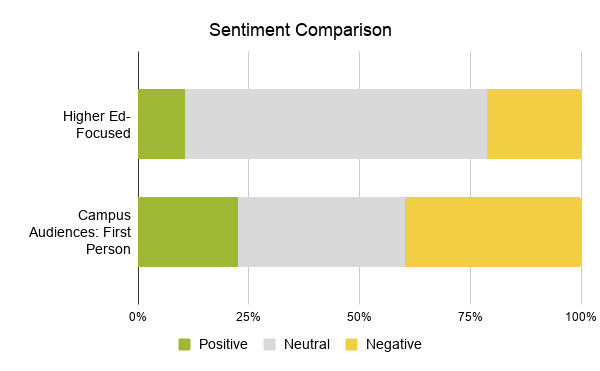 Audience Insights: Focus on Hidden Voices of Students
Audience Insights: Focus on Hidden Voices of Students
When the conversation is this large it’s hard to find the individual voices. While over 128,000 individual accounts contributed to higher ed-focused conversation, only four percent of the mentions were first person accounts from individuals who revealed their current student status. These hidden voices represent lived experiences that provide valuable insight as you craft your communication and service delivery.
Urbana University Student Athletes
For the first time in our Briefings, a specific institution dominated the student conversation, accounting for 30 percent of student mentions. On April 21, Urbana University, a branch campus of Franklin University, announced it would cease physical operations this spring, leaving its roughly 350 residential and commuter students exploring their options for the fall semester. Even before the campus sent its first official tweet about the news at 11:33 a.m. ET, its NCAA Division II student athletes took to Twitter to announce they were “looking for a new home” and noting their remaining years of eligibility. Despite most athletes having modest followings, their pleas were liked and retweeted at a high rate, almost immediately. The majority of their activity occurred on April 21, with some lingering shares on the following days. The following chart shows the number of tweets and retweets per hour from the Urbana University student athletes April 21–22.
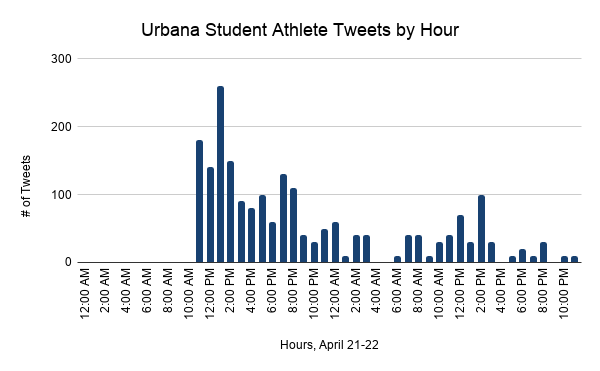 The university’s Office of Compliance issued a statement granting its athletes permission to contact any institution following the discontinuation of its sports programs.
The university’s Office of Compliance issued a statement granting its athletes permission to contact any institution following the discontinuation of its sports programs.
What Students Are Angry About
The two most predominant emotions in student conversation since we started the Briefings are anger and sadness. After excluding the Urbana student athletes, 44 percent of student mentions that expressed emotion conveyed anger. Here are the top 20 topics students who expressed anger discussed.
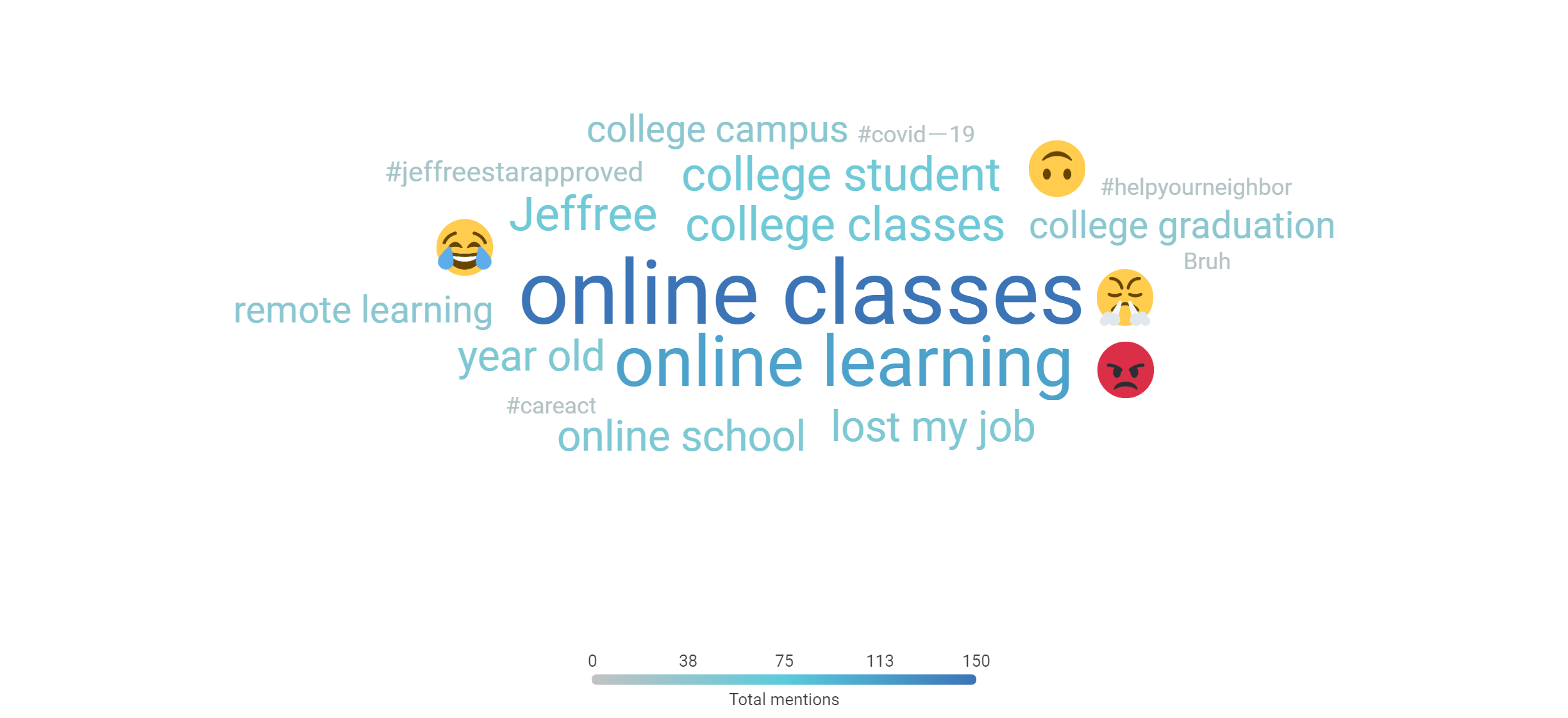
You’ll notice more mentions of makeup artist and online celebrity Jeffree Star, who first appeared in our March 31 Briefing. On April 21, Jeffree once again told Twitter followers they had a chance to get their bills paid, and students responded stating the need caused by campus closures. They were among over 127,000 responses to Jeffree’s post.
He Said, She Said: Redditors Continued Fall Semester Speculation
Current students discussed whether courses would be online or in person in the fall in this “megathread” in r/college, starting on Friday, April 24. Multiple commenters mention they know “schools need their money.” There are interesting reports of what students have heard from campus staff (e.g., advisors, instructors, department heads, student employment supervisors), even if their campus hasn’t made an announcement yet. The following are quotes from the thread.
- I talked to my academic advisor at a college in Wisconsin and she said if she were a betting woman, she’d bet that we won’t have either fall or spring semester in-person.
- Some of the department heads have already decided or are starting to decide to move their classes completely online, so even if our school is allowing in person classes, half of our classes might end up being online anyways.
- <Campus> hasn't said anything about fall classes, but various departments have been consolidating 7–8 sections of a fall class into only 2–3 sections with the assumption that classes will be online in the fall.
- My teacher said she would bet $1,000 we have classes online in fall
- <Campus> hasn’t officially stated anything, but from what I heard it’s plausible we might have virtual classes for lectures and in person classes for labs with heavy restrictions.
- I heard directly from one of the program heads that ‘The only way we won't [have in-person classes in fall] is if the state says we can't.’
- I was able to pick out a dorm, my classes have room numbers and times etc. BUT culinary services emailed us to let us know they cannot let us schedule our fall work schedules yet until the university announces we are in person for sure.
- I live in the same town as a large state school and I heard from my mother who has a very credible source at the university that they are planning on going ahead with face to face classes unless worst case scenario happens.
At least one student clearly stated they were looking to Reddit (specifically, the megathread) for information about their specific institution because they hadn’t heard anything. Another said, “A college confirming now means nothing. I wouldn’t trust confirmations until like mid July.” Yet another commenter said that their department told them if they’re online next semester, some students won’t be able to take courses required for their major.
Summary and Recommendations
Conversation volume decreased slightly compared to last week. Eight percent of mentions referenced the fall semester or beyond, up from five percent last week. 39 percent of mentions were higher ed-focused. Conversation sources for all mentions and higher ed-focused mentions were distributed similarly to the prior week. Half of mentions related to the fall semester appeared on news sites, an increase from 27 percent the prior week. Top higher ed-focused conversation topics referenced general pandemic and university terms, and specifically mentioned Urbana University (closing Spring 2020)and both the University of Chicago and the University of Miami, whose antibody test news spread via online influencers more than traditional media. Sentiment was fairly consistent with last week. Student conversation was dominated by displaced Urbana student athletes (30 percent of student conversation). Top topics of angry students included online classes, college graduation, and job loss. Students continued to speculate about the fall semester on Reddit, sharing gossip they’d heard from campus staff members.
- Conversation about fall semester should be ongoing. The percentage of higher ed-focused conversation about the fall semester is increasing. It’s a hot topic in the media, as well as with students and their families. Students seem to understand that institutions may not be able to make a definitive call about fall right now, but they do want to hear from you. Even if you’ve made an announcement, provide regular updates to confirm or adjust your plans. Additionally, set clear expectations with staff regarding their communications with students and other campus constituents about the fall semester. Don’t let them end up in a situation where they feel like they have to make their best guess.
- Coordinated campaigns make a statement. The AAU #ProudToBeOnTheirTeam campaign shared a hopeful, consistent message with tens of millions of people. United by a single message, participating institutions shared their pride with unique brand flair (e.g., Indiana University, University of Iowa, Emory University, University of Rochester). Other associations or affiliate groups should consider coordinated campaigns that support their mission and public health to maintain brand awareness during the pandemic.
- Media may not be the public’s main news source. Institutions regularly tout the impact their research has on communities. If actionable research is part of your brand, you should know how it’s being interpreted and spread online by influencers. Many online personalities are seen as a credible news source despite lacking journalism credentials.
Stay Connected with Future Briefings
The Coronavirus Higher Education Industry Briefing is Campus Sonar’s first real-time industry research project.

